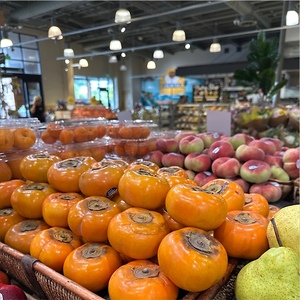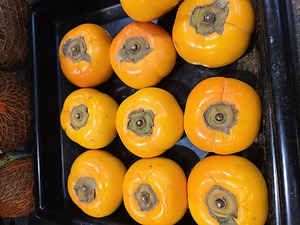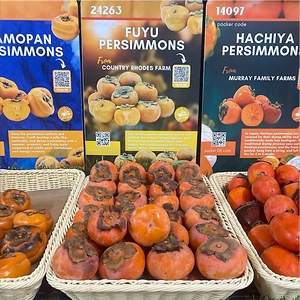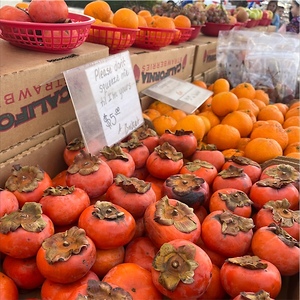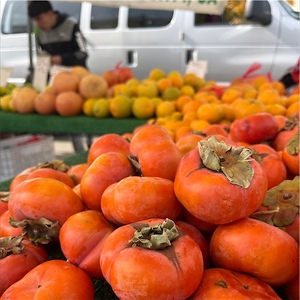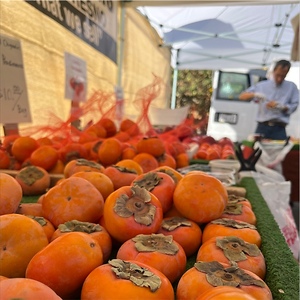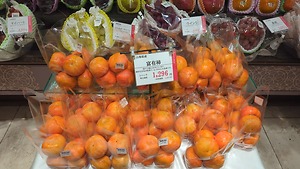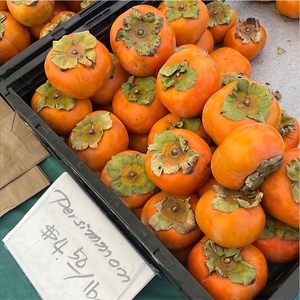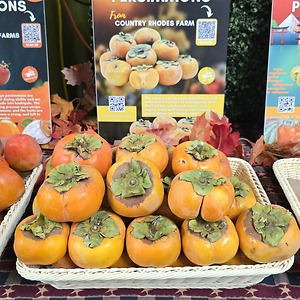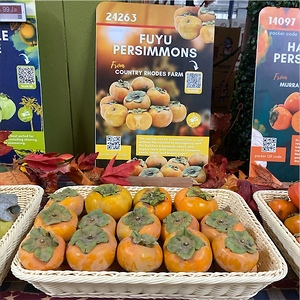

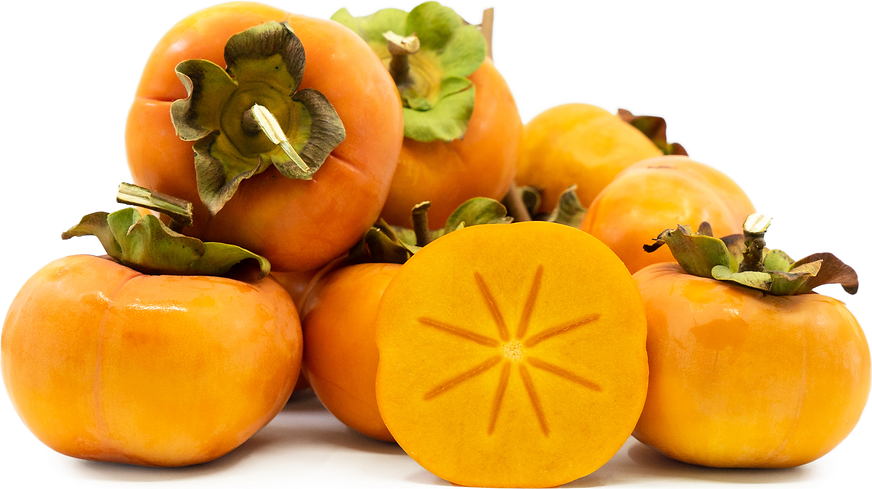
Fuyu Persimmons
Estimated Inventory, 40 lbs : 0
This item was last sold on : 03/25/25
Description/Taste
Fuyu persimmons are a small to medium-sized varietal, averaging 5 to 7 centimeters in diameter, and have a squat, round, oblate, flattened appearance, sometimes exhibiting four shallow sides. The persimmon's skin is thin, taut, glossy, and smooth, showcasing light orange to dark orange-red hues. The fruits are also capped with a green leafy calyx, and these tops should be more green than brown when purchasing the fruit, a sign of freshness. Underneath the surface, the pale orange flesh is initially dense, smooth, firm, succulent, and crisp. As the fruit matures, it will soften slightly, developing an aqueous and tender consistency. Fuyu persimmons lack central cores, allowing the entire fruit to be consumed. Most of the fruits are also seedless, but depending on cultivation, one to two seeds may appear. Fuyu persimmons are low in tannins, preventing the fruits from having the unpleasant, dry mouthfeel that is often associated with persimmons. The variety can be consumed firm or soft without the concern of astringency, and the fruit has a honeyed, sweet, and sugary taste with nuances of cinnamon, pears, dates, and brown sugar.
Seasons/Availability
Fuyu persimmons are available in the mid-fall through winter.
Current Facts
Fuyu persimmons, botanically classified as Diospyros kaki, are a mid-to-late season variety belonging to the Ebenaceae family. The oblate, somewhat flattened fruits are a type of non-astringent persimmon, meaning they are low in tannins, allowing the flesh to be consumed straight off the tree. Fuyu persimmons are native to Asia and are often labeled as a variety of Japanese, Chinese, Asian, or Oriental persimmon. The non-astringent variety is one of the most popular persimmon varieties cultivated worldwide and is favored for its versatile nature. Fuyu persimmons can be eaten when they are firm and crisp, or they can be left to soften. The lack of astringency within the flesh separates Fuyu persimmons from other commercial varieties, such as Hachiya, and the fruit's ability to be eaten while still firm allows consumers instant gratification, making it a choice variety for grocers, supermarkets, and distributors. Fuyu persimmons can be incorporated into fresh and cooked preparations, and the variety is a common seasonal delicacy sold worldwide. It is important to note that Fuyu is sometimes used as a blanket term for non-astringent persimmon varieties. Generally, these varieties are similar in appearance and flavor, but Fuyu is also a specific term used for one type of non-astringent persimmon.
Nutritional Value
Fuyu persimmons are a source of vitamin C to strengthen the immune system, fiber to regulate the digestive tract, vitamin E to reduce inflammation, and potassium to balance fluid levels within the body. The persimmons also provide some phosphorus to repair tissues and cells, vitamin K to assist in faster wound healing, calcium to build strong bones and teeth, and other nutrients, including magnesium, iron, manganese, B vitamins, and beta-carotene. Beta-carotene is a natural, pigmented compound converted into vitamin A in the body to maintain healthy organ functioning and support vision. In Traditional Chinese Medicine, persimmons are viewed as containing cold yin energy, helping to expel heat in the body. The fruits are also believed to improve complexion, and when steeped into a tea, they can relieve coughing or hiccups.
Applications
Fuyu persimmons have a rich, sweet, and sugary taste suited for fresh and cooked preparations. The variety is traditionally consumed straight out of hand and is valued for its non-astringent nature, allowing the fruits to be eaten when firm. Fuyu persimmons also have a crisper texture than other persimmon varieties, adding an unusual consistency to salads, grain bowls, salsa, or noodle dishes. The fruits can be sliced and served on cheese boards, wrapped in cured meats as an appetizer, used as a topping for toast or pizza, blended into smoothies, or chopped and sprinkled over yogurt and other breakfast dishes. In addition to fresh preparations, Fuyu persimmons can be cooked into sweet or savory dishes and are frequently simmered into jams, jellies, and sauces. The fruits can also be cooked and pureed into pies, bread, pudding, and cakes, incorporated into ice cream, baked into tarts, roasted as a side dish, or stuffed into pork tenderloin. Beyond fresh and cooked preparations, Fuyu persimmons can be thinly sliced and dried into a chewy snack. Fuyu persimmons pair well with spices such as cinnamon, nutmeg, cloves, and ginger, vanilla, brown sugar, cheeses such as mascarpone, mozzarella, and goat, nuts including pecans, pistachios, walnuts, and almonds, and herbs such as mint, basil, and cilantro. Unwashed Fuyu persimmons will keep for 7 to 14 days when stored leaf side down in the refrigerator or frozen for up to 3 months. Frozen Fuyu persimmons can be eaten like custard. The tops of the fruit are sliced off when still cold, creating a small bowl. The frozen flesh can be scooped out with a spoon and enjoyed as a refreshing treat.
Ethnic/Cultural Info
Persimmons are considered lucky in China and are often given as gifts at weddings and during the Lunar New Year. Gifting persimmons at weddings is believed to bring the happy couple a blessing of eternal love, and the gold coloring is viewed as a blessing of prosperity. The Chinese character for persimmon, roughly pronounced as "shi," is also a homophone with the Chinese characters used for "market," "thoughts," "business," and "things." These similar-sounding words are traditionally strung together to create a phrase that loosely translates to "everything according to your wishes" or "many things be as you wish them to be." This phrase is often used in business and celebratory affairs, and persimmons are given as presents of good luck. During the Lunar New Year, persimmons are baked into cakes and are shared with friends and family in the hope that their endeavors in the year to come will be blessed. The fruits are also consumed fresh or incorporated into other baked goods and treats as a festive dish.
Geography/History
Several persimmon varieties are native to Asia, specifically China, and have been cultivated since ancient times. Persimmons are descendants of wild fruits that were selected for specific traits and were primarily domesticated during the Qin and Han dynasties from 221 BCE to 220 CE. Later in the Tang and Song dynasties, persimmons were grown on a large scale and introduced to countries throughout Asia, most notably Japan in the 7th century, Korea, Vietnam, Burma, India, Indonesia, and the Philippines. In 1856, American Commander M.C. Perry carried persimmons seeds back to the United States from Japan when returning home from a naval fleet visit, but the seeds did not survive after being planted. The first successful persimmon introduction into the United States from Asia was in 1870 when the United States Department of Agriculture imported numerous Asian persimmon varieties, including Fuyu persimmons, and planted them throughout California and the southern United States. Asian persimmons were also planted in Queensland, Australia, in 1885. In the early 20th century, Japanese and Chinese immigrants planted more varieties of persimmons in the United States as they settled, and Asian persimmons were later planted in Brazil. Today Fuyu persimmons are a type of Asian persimmon commercially cultivated worldwide. The non-astringent cultivar is grown throughout Asia, Australia, Europe, North America, and South America, and the largest producer of Fuyu persimmons is China. In the United States, Fuyu persimmons are cultivated in California in the Central San Joaquin Valley, San Diego, Riverside, and Orange County.
Recipe Ideas
Recipes that include Fuyu Persimmons. One



